Brazilian regulators recently reached a settlement with the cryptocurrency exchange Binance, requiring the company to pay $1.76 million to resolve allegations of unlicensed derivatives trading in the country. This settlement with the Comissão de Valores Mobiliários (CVM), Brazil’s securities regulator, brings an end to a year-long investigation into Binance’s operations in Brazil.
The regulatory crackdown on Binance began in July 2020 when the CVM instructed the exchange to halt its unauthorized activities in Brazil. However, despite the warning of a daily fine of 1,000 reais for non-compliance, Binance continued to operate, leading to further action from the CVM. The regulator accused the exchange of operating without the proper authorization for derivatives trading, a sector that has gained significant traction in Brazil’s growing cryptocurrency market.
Brazil’s economic challenges, characterized by high inflation and a weakening currency, have contributed to a surge in crypto adoption within the country. As financial stability becomes increasingly uncertain, many Brazilians have turned to digital assets as a means of hedging against the devaluation of the local fiat currency. By 2021, approximately 8% of Brazil’s population had invested in cryptocurrencies, placing the country 14th globally in terms of crypto adoption.
In response to the rising trend of cryptocurrency adoption, the Brazilian government introduced the Pix payment system in 2020. This real-time digital finance platform has further facilitated the use of cryptocurrencies by making digital transactions more accessible and commonplace. Despite facing regulatory hurdles, local cryptocurrency exchanges in Brazil have continued to thrive. The growth in digital literacy and the increasing familiarity with digital finance have positioned cryptocurrencies as a viable alternative investment option for many Brazilians.
The regulatory challenges faced by Binance in Brazil highlight the complexities of operating in the cryptocurrency market amidst evolving legal frameworks and growing government scrutiny. As the adoption of digital assets continues to rise globally, it is crucial for cryptocurrency exchanges to adhere to regulatory requirements to ensure the long-term sustainability and legitimacy of the industry.
















Leave a Reply